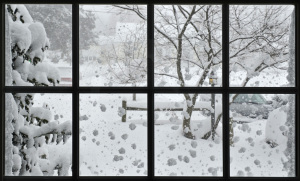Walls are the main structural component of any building or structure. With wood frame construction, the combined weight of the roof and any weight supported by the roof (ie. snow) push down on the walls with a compressive force. From the sides, wood frame structures also take on lateral loads imposed by strong winds and winds gusts that tend to distort the walls because of the shearing force. Building codes require walls to be designed to withstand these loads. However, when walls are built to minimum safety standards, you may experience wall creaking during high winds and/or overall house shaking when doors are slammed or the kids are actively romping around.
In a series of racking tests*, walls with and without polyurethane spray foam insulation were compared. Two exterior facing materials were tested:
- vinyl siding installed over 15 lb. building paper
- 5/8″ textured plywood siding
All walls were faced with half-inch sheet rock on the interior using 16″ stud spacing. Where spray foam insulation was used, stud cavities were essentially completely filled with a density of 1.5 lb/ft³.
Where spray foam insulation was not used, results of the test indicated the maximum racking load on the vinyl-sided walls to be at approximately 1,000 lbs., and 3,000 lbs. for the plywood siding. However, in the walls insulated with polyurethane spray foam insulation, the maximum racking load supported was almost 3,000 lbs. for the vinyl siding sample, and over 5,000 lbs. for the plywood siding. This equates to an increase in wall strength of over 50% where spray foam insulation was used.






